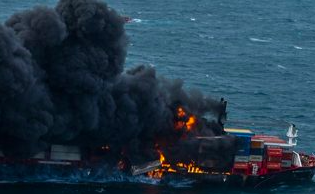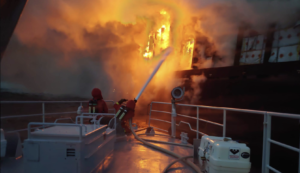Over 70 billion plastic nurdles in sea after X-Press Pearl disaster

The X-Press Pearl disaster, in which a cargo ship carrying chemicals caught on fire off the coast of Sri Lanka in May 2021, has resulted in the spillage of an estimated 70 billion nurdles (spherical pieces of plastic) into the ocean.
According to a study published in the Environmental Journal of the American Chemical Society, the M/V X-Press Pearl cargo ship caught fire 18 km off the west coast of Sri Lanka and spilled approximately 1,680 tons of spherical pieces of white plastic or ‘nurdles’, measuring just 5mm wide.
Nurdles are the preproduction plastic used to manufacture a wide range of end products. The report states that exposure to combustion, heat, and chemicals led to agglomeration, fragmentation, charring, and chemical modification of the plastic, creating an unprecedented complex spill of visibly burnt plastic and unburnt nurdles. These pieces span a continuum of colours, shapes, sizes, and densities with high variability that could impact cleanup efforts, alter transport in the ocean, and potentially affect wildlife.
X-Press Pearl was carrying 1,486 containers with 25 tons of nitric acid, other chemicals, and cosmetics before it sank off the Port of Colombo on 2 June after burning for almost two weeks. The environmental impact on the ocean habitat and shores of Sri Lanka has been catastrophic.
Visibly burnt plastic was three-fold more chemically complex than visibly unburnt nurdles. This added chemical complexity included combustion-derived polycyclic aromatic hydrocarbons. A portion of the burnt material contained petroleum-derived biomarkers, indicating that it encountered some fossil-fuel products during the spill. The findings of this research highlight the added complexity caused by the fire and subsequent burning of plastic for cleanup operations, monitoring, and damage assessment and provides recommendations to further understand and combat the impacts of this and future spills.
According to local reports, sea turtles and dolphins washed ashore following the incident as a result of suspected poisoning by toxins released from X-Press Pearl’s cargo.










